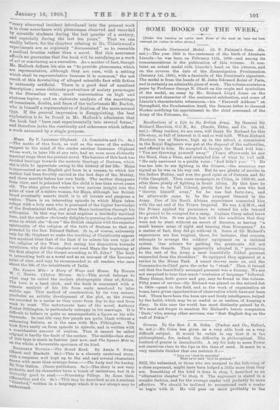Maya. By P. Laurence Oliphant. (A. Constable and Co. Os.)
--The motto of this book, as well as tho name of the author, euggest to the mind of the reader another Laurence Oliphant whose work, in later life at any rate, had an oven more distinctly Mystical tinge than the present novel. The heroine of this book has decided leanings towards the esoteric theology of Brahma, which she is able to appreciate owing to the history of her life. Maya is represented as an English girl born in a zenana, to which her Mother had been forcibly carried in the last days of the Mutiny, and three months before her own birth. The mother disappears from view, and is poisoned when the child is less than seven years old. The story gives the reader a very curious insight into the Point of view of a native woman, for Maya, although her British blood eventually asserts itself, is to all intents and purposes a native. There is an interesting episode in which Maya takes refuge with a holy man who is possessed of the higher knowledge of the 13rahminical faith, and gives Maya instruction through his soliloquies. In this way her mind acquires a decidedly mystical turn, and the author obviously delights in penning the subsequent Scene in which she " floors " the British chaplain with the superior Spirituality of the religion of the faith of Brahma to that ex- pounded by the Rev. Edward Talbot. It is, of course, extremely easy for Mr. Oliphant to make the teaching of Christianity appear less mystical than that of the East if he selects his own type of the religion of the West. But seeing her disposition towards mysticism, why did the chaplain not read Maya the beginning of the first chapter of the Gospel according to St. John ? The book le interesting both as a novel and as an account of the heroine's Point of view, and may be recommended to all readers who care about the life of the inhabitants of India.




































 Previous page
Previous page